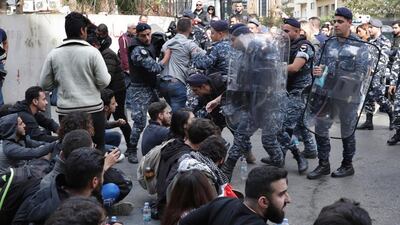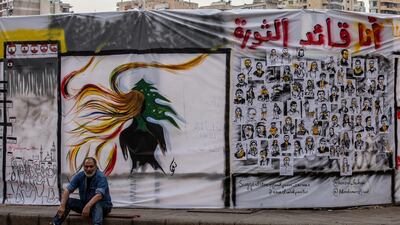Lebanon’s judicial and security authorities are investigating violent clashes between protesters blocking one of Beirut’s main motorways and supporters of two Shiite parties, Hezbollah and Amal, on Sunday.
Lebanon’s state-run National News Agency reported that a large number of soldiers and civilians were injured in the clashes, and cars and shops were destroyed.
Witnesses said fighting broke out shortly after dozens of people gathered about 9pm to block a motorway known as The Ring, which has become a hot spot for protests.
A group of young men arrived on motorbikes and began cursing Hezbollah leader Hassan Nasrallah, a woman said.
To try to defuse any tension, protesters sang the national anthem and popular slogans, but a fight broke out between Hezbollah supporters and other demonstrators.
A video on social media showed protesters chanting “Hezbollah are terrorists”.
Others who carried Hezbollah's yellow flag responded with shouts of "God, Syria, Bashar and that's all", a reference to Syria's President Bashar Al Assad, a Hezbollah ally, local newspaper The Daily Star reported.
The pro-Hezbollah group threw rocks at protesters before the army charged and fired tear gas to disperse the crowd in the early hours of the morning.
Although two similar incidents have occurred on the same Beirut road over the past few weeks, this is the first time that an official investigation has been announced.
Other clashes occurred between those who support Hezbollah and those who do not, but the slogans on Sunday evening were noticeably more sectarian than before.
The Ring links Christian eastern neighbourhoods of the capital with Shiite-dominated western parts.
Protesters stayed on the motorway until dawn, but it had been cleared and traffic had returned to normal by mid-morning.
Joseph Tawk, a columnist at Al Joumhouria newspaper, posted a video of himself on Twitter after he was beaten up on Sunday evening at The Ring.
Smiling despite a bloody nose, he accused the thugs who attacked him of not representing the Shiite community.
“We are not thugs," Tawk said. "We are Lebanese men and women. We are chanting slogans peacefully. We want a country. What do you want? Just sectarian leaders and Hezbollah?”
The UN special co-ordinator for Lebanon, Jan Kubis, urged all Lebanese political factions to try to calm their supporters.
Nationwide anti-government protests began on October 17 after the government tried to introduce new taxes.
Protesters now say they reject the entire Lebanese political system, which they accuse of corruption, and are demanding elections.
On Sunday evening, Hezbollah and Amal supporters also ransacked about 40 tents that had been set up near Al Amin Mosque in central Beirut by civil activists and people affiliated to local universities.
Watching men reassembling the tents the next morning, activist Riad Issa said he believed the violence on Sunday was fuelled by ignorance.
“The people who used violence against us are like us,” Mr Issa said. “They are also oppressed by politicians.
"But maybe they have not arrived at the point where they can free themselves from sectarianism.”
Asked why the Shiite community felt threatened by the protests, Mr Issa said he believed it was because they felt that Hezbollah was being asked to give up its weapons.
“They think it’s against them but it’s not true,” he said. “We want a technocratic government without politicians because they have failed us for the past 30 years.
"We do not want Hezbollah, but at the same time we do not want the Free Patriotic Movement and the Future Movement.”








